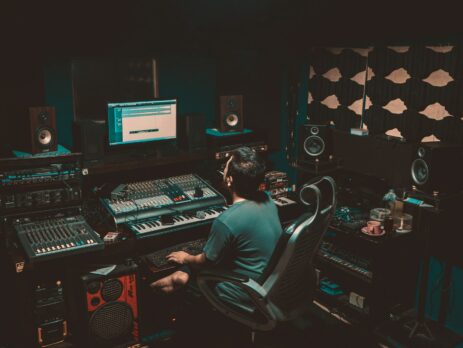The Podcast Revolution: Hiring Audio Content Creators
The rise of podcasts as a mainstream media channel has opened up new avenues for content creation and distribution. This digital renaissance is not just reshaping how we consume information and entertainment but also how organizations approach hiring audio content creators. As podcasts continue to gain popularity, the demand for skilled audio content creators has surged, prompting many to consider a career in this dynamic field.
Podcasts offer a unique blend of storytelling and information dissemination, making them an attractive platform for businesses and individuals alike. This growing medium requires a diverse set of skills, from technical audio engineering to creative storytelling and marketing. The role of an audio content creator is multifaceted, involving the production of engaging and high-quality audio content that can captivate an audience.
For businesses, the integration of podcasts into their marketing strategies can enhance brand visibility and connect with audiences on a more personal level. This has led to an increased need for creative staffing agencies that specialize in sourcing talent capable of crafting compelling audio narratives. These agencies play a crucial role in bridging the gap between talented audio creators and organizations looking to amplify their brand voice.
The process of hiring audio content creators involves several key considerations. Employers must assess technical skills, such as sound editing and production, as well as creative abilities like scriptwriting and storytelling. Moreover, understanding the nuances of audio branding and audience engagement strategies is essential for creating impactful podcast content.
As the industry evolves, so too does the role of audio content creators. They are no longer just technicians but are now considered integral to the creative and strategic processes. This shift underscores the importance of continuous learning and adaptation in a field that is constantly influenced by technological advancements and changing listener preferences.
Another significant aspect of hiring in this field is the emphasis on diversity and inclusion. Podcasts reach a global audience and thus require voices that reflect a broad spectrum of experiences and perspectives. This diversity not only enriches the content but also ensures that it resonates with a wider audience, making inclusivity a key factor in the hiring process.
The challenges associated with hiring skilled audio content creators are manifold. One of the primary hurdles is the competitive market, driven by the high demand for these professionals. Companies must offer compelling reasons for top talent to join their teams, which often includes opportunities for creative freedom, competitive compensation, and the potential for growth.
To aid in the recruitment and retention of audio content creators, many organizations turn to specialized staffing solutions. Creative staffing agencies, like icreatives, provide expertise in sourcing and placing top-tier audio talent. We can understand the specific needs of the industry and we can offer valuable insights into building effective audio content teams.
For those looking to venture into the world of podcasting, understanding the landscape of audio content creation is crucial. It involves not only mastering technical skills but also embracing creativity and strategic thinking. The role of an audio content creator is evolving, and with it, the opportunities for innovative and impactful storytelling are expanding.
In conclusion, as podcasts continue to grow in popularity and influence, the demand for skilled audio content creators will only increase. This dynamic field offers numerous opportunities for creative expression and professional growth, making it an exciting career path for aspiring and experienced creators alike.
Most Asked Questions About Hiring Audio Content Creators
- What are the essential skills required for an audio content creator?
- How do creative staffing agencies facilitate the hiring of audio content creators?
- What are the benefits of incorporating podcasts into a company’s marketing strategy?
- How can diversity and inclusion be prioritized in the hiring process for audio content creators?
- What challenges do companies face when hiring audio content creators?
- How can companies attract and retain top audio content creation talent?
- What future trends are shaping the podcast industry and the role of audio content creators?

What are the essential skills required for an audio content creator?
Audio content creators are at the heart of podcast production, blending creativity with technical expertise to produce compelling audio experiences. The essential skills required for this role can be broadly categorized into technical skills, creative skills, and soft skills.
Technical Skills:
- Audio Editing and Production: Proficiency in using audio editing software like Adobe Audition, Audacity, or Pro Tools is crucial. This includes knowledge of mixing, mastering, and sound design.
- Recording Techniques: Understanding different recording environments and microphone techniques to capture the best possible sound.
- Sound Engineering: The ability to troubleshoot technical issues and ensure high-quality audio output.
Creative Skills:
- Storytelling: Crafting engaging and coherent narratives that captivate listeners.
- Scriptwriting: Developing scripts that are both informative and entertaining, tailored to the target audience.
- Content Planning: Strategizing content to maintain consistency and relevance over time.
Soft Skills:
- Communication: Effective communication skills to collaborate with team members and interview guests.
- Adaptability: Being able to adapt to new trends and technologies in the rapidly evolving podcast industry.
- Time Management: Managing multiple projects and meeting deadlines without compromising quality.
These skills are foundational to succeeding in the podcasting industry. However, continuous learning and adaptation are also vital, as new technologies and listener preferences can change the landscape of audio content creation.
For more insights on managing creative projects and teams, consider reading about Successfully Managing Software Development Teams.
How do creative staffing agencies facilitate the hiring of audio content creators?
Creative staffing agencies play a pivotal role in the hiring process for audio content creators by connecting talented individuals with companies seeking to enhance their audio content. These agencies specialize in understanding the unique needs of the creative industry, making them invaluable partners in the recruitment process.
Identifying Talent: Agencies have access to a wide network of professionals and use advanced recruiting tools to identify candidates who not only have the necessary skills but also fit the company culture.
Vetting Process: They conduct thorough vetting, which includes reviewing portfolios, conducting technical tests, and verifying previous work experience, to ensure candidates meet the high standards required for audio production.
Customized Recruitment: Understanding that each company has unique needs, creative staffing agencies tailor their search and selection process to align with specific project requirements and company goals.
Onboarding Support: Beyond recruitment, these agencies often provide onboarding support to ensure a smooth transition for both the company and the new hire, which is crucial for long-term success.
Market Insights: They also offer valuable insights into market trends and salary benchmarks, which can help companies make informed decisions when hiring audio content creators.
By leveraging the expertise of a creative staffing agency, companies can streamline their hiring process, reduce hiring risks, and ensure they attract top-tier talent in the competitive field of audio content creation.
To explore further how creative staffing agencies can enhance your hiring strategy, visit icreatives Find Talent.
What are the benefits of incorporating podcasts into a company’s marketing strategy?
Podcasts offer numerous benefits as part of a comprehensive marketing strategy. They provide a platform for companies to deepen engagement with their audience, enhance brand visibility, and establish thought leadership in their industry.
Audience Engagement: Podcasts create a personal connection with listeners, often leading to a loyal audience base. This engagement is enhanced through the intimate and conversational nature of podcasts, making them an effective tool for building customer relationships.
Brand Visibility: Regular podcast episodes keep your brand top of mind. They can also be integrated with other marketing efforts, such as social media and blogs, to boost overall visibility.
Thought Leadership: By discussing industry trends, offering insights, and interviewing experts, companies can establish themselves as thought leaders, enhancing their credibility and attracting new business opportunities.
Cost-Effective: Compared to other media, podcasts can be a cost-effective marketing tool with the potential for a high return on investment. They require minimal equipment and can be distributed globally at little to no cost.
SEO Benefits: Podcasts can contribute to SEO efforts. Transcripts, for instance, provide fresh content that can improve search engine rankings.
Accessibility: Podcasts offer convenience and accessibility, allowing listeners to consume content on the go, whether they are commuting, exercising, or relaxing at home.
Incorporating podcasts into your marketing strategy can not only enhance your reach and engagement but also provide a versatile platform for creative storytelling and brand promotion.
For more information on integrating podcasts into your marketing strategy, read Why Your Company Should Outsource Social Media.

How can diversity and inclusion be prioritized in the hiring process for audio content creators?
Diversity and inclusion are critical components of any hiring strategy, especially in creative fields like podcasting, where varied perspectives can significantly enrich content. Prioritizing these elements involves several strategic actions.
Inclusive Job Descriptions: Crafting job descriptions that are inclusive and welcoming to all, avoiding language that could be unconsciously biased towards certain demographics.
Diverse Recruitment Channels: Utilizing a variety of recruitment channels to reach a broader audience. This includes partnering with organizations that support underrepresented groups in the media industry.
Bias-Free Selection Process: Implementing structured interviews and standardized evaluation criteria to minimize personal biases that might influence hiring decisions.
Diversity Training: Providing training for hiring managers and recruiters on diversity and inclusion best practices.
Feedback Mechanisms: Establishing clear channels for feedback on the recruitment process from candidates, which can help identify and rectify any issues of bias or unfairness.
Promoting Company Culture: Clearly communicating the company’s commitment to diversity and inclusion during the recruitment process, which can attract candidates who value these qualities in a workplace.
By embedding diversity and inclusion into the hiring process, companies not only enhance their team’s creativity and innovation but also reflect a commitment to social responsibility.
To learn more about fostering inclusivity in your team, consider reading Building Trust Between Managers and Employees.
What challenges do companies face when hiring audio content creators?
Hiring audio content creators presents several challenges that companies must navigate to secure the best talent. These challenges range from identifying the right skill set to competing with other employers in a tight job market.
Skill Identification: Determining the specific skills and experience required for audio content creation can be complex, especially for companies new to podcasting.
High Demand for Talent: As the popularity of podcasts grows, so does the demand for skilled audio creators, making the hiring market highly competitive.
Cultural Fit: Finding candidates who not only have the technical and creative skills but also fit well with the company culture and values can be challenging.
Budget Constraints: Budget limitations can restrict the ability to offer competitive salaries or invest in high-quality recording equipment, which may deter top talent.
Keeping Up with Technology: The rapid pace of technological change in audio production requires candidates who are not only skilled with current technologies but are also willing and able to learn new tools and techniques.
Remote Work Dynamics: With many audio content creators working remotely, companies must adapt their recruitment, onboarding, and management practices to support a distributed workforce effectively.
Addressing these challenges requires a strategic approach to recruitment, including clear job descriptions, competitive compensation packages, and a strong employer brand.
For tips on managing remote teams, read Tips for Managing a Remote Workforce.
How can companies attract and retain top audio content creation talent?
Attracting and retaining top talent in audio content creation involves a combination of competitive compensation, creative freedom, and career development opportunities.
Competitive Compensation: Offering attractive salary packages along with benefits such as health insurance, retirement plans, and performance bonuses can make a position more appealing.
Creative Freedom: Allowing creators the freedom to experiment and express their ideas can lead to more innovative and engaging content, increasing job satisfaction.
Career Development: Providing opportunities for professional growth, such as training in the latest audio production technologies and attendance at industry conferences, can help retain talent.
Work-Life Balance: Encouraging a healthy work-life balance through flexible working hours and remote work options can enhance job satisfaction and loyalty.
Recognition and Rewards: Implementing a system to recognize and reward outstanding work can motivate creators and reinforce their value to the organization.
Inclusive Work Environment: Fostering a workplace culture that values diversity and inclusion can attract a wider range of talent and promote a sense of belonging among team members.
By focusing on these areas, companies can not only attract but also retain skilled audio content creators who are essential to producing high-quality podcasts.
For more on recognizing employee contributions, see 10 Ways to Recognize Employees.
What future trends are shaping the podcast industry and the role of audio content creators?
The podcast industry is continually evolving, influenced by technological advancements, changing listener preferences, and broader media trends. Understanding these trends can help audio content creators and companies stay ahead in a competitive market.
Technological Innovations: Advances in AI and machine learning are transforming audio editing and production, making it more efficient and opening up new creative possibilities.
Increased Monetization Options: With more businesses investing in podcasts as a marketing tool, there are greater opportunities for monetization through sponsorships, branded content, and subscription models.
Niche Podcasting: As the market becomes more saturated, there is a growing trend towards niche podcasts that cater to specific interests or communities, requiring creators to have specialized knowledge or perspectives.
Global Expansion: Podcasts are reaching a global audience, necessitating content that is culturally diverse and often multilingual.
Video Podcasting: The rise of video podcasting allows creators to engage with their audience through multiple channels, increasing the demand for skills in video production and editing.
Interactive and Immersive Experiences: Emerging technologies like augmented reality (AR) and virtual reality (VR) are beginning to influence how podcasts are produced and consumed, leading to more interactive listener experiences.
Staying informed about these trends and adapting to them is crucial for anyone involved in the podcast industry, from content creators to marketing executives.
To delve deeper into how technology is influencing creative industries, read The Ultimate Guide to Boost Your Productivity with AI Tools at Work.
Conclusion
The podcast revolution has significantly impacted the media landscape, creating substantial opportunities for audio content creators and the companies that hire them. As this medium continues to grow, the demand for skilled creators who can produce engaging, high-quality content will only increase. Companies looking to leverage this trend will need to focus on strategic hiring practices, embracing diversity, and fostering a culture of creativity and innovation.
By understanding the essential skills required, utilizing creative staffing agencies, and keeping abreast of industry trends, businesses can effectively integrate podcasts into their marketing strategies and reap the benefits of this powerful communication tool. Moreover, prioritizing the attraction and retention of top talent will be crucial in maintaining a competitive edge in this evolving industry.
As podcasts become an increasingly integral part of our cultural and digital landscape, the opportunities for creative expression and professional growth in audio content creation are boundless. For those ready to dive into this dynamic field, the future is bright, filled with the potential for innovation and global reach.
For further exploration of creative careers and industry insights, visit our page icreatives Find Work.












